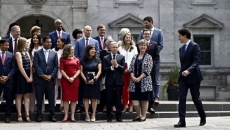The federal government is slashing immigration targets as Prime Minister Justin Trudeau admits the government did not get the balance right following the COVID-19 pandemic.
The government had targeted bringing in 500,000 new permanent residents in both 2025 and 2026.
Next year's target will now be 395,000 new permanent residents, which will continue to fall to 380,000 in 2026 and 365,000 in 2027.
"In the tumultuous times as we emerged from the pandemic, between addressing labour needs and maintaining population growth, we didn't get the balance quite right," Trudeau said Thursday morning.
"With the plan we're announcing today, along with previously announced measures, we're making our immigration system work better."
We’re going to significantly reduce the number of immigrants coming to Canada for the next two years. This is temporary — to pause our population growth and let our economy catch up.
— Justin Trudeau (@JustinTrudeau) October 24, 2024
We have to get the system working right for all Canadians.
Watch live: Prime Minister Justin Trudeau and the Minister of Immigration, Refugees and Citizenship, Marc Miller, make an announcement on the Government of Canada's Immigration Levels Plan. Tune in: https://t.co/Oz2IaSCL1a pic.twitter.com/p8SW0bXMdz
— CanadianPM (@CanadianPM) October 24, 2024
Immigration is our superpower — and always will be. pic.twitter.com/3AbBuEpN2r
— Justin Trudeau (@JustinTrudeau) October 25, 2024
The change comes after significant criticism of the Liberal government's increases to immigration and the impact of strong population growth on housing availability and affordability.
The government's goal is also to reduce the number of temporary residents to five per cent of the population over the next three years, down from 7.2 per cent in July.
The federal government estimates this will mean the non-permanent resident population will decrease by 445,901 in 2025, 445,662 in 2026 and will increase modestly by 17,439 in 2027.
The moves come after years of rapid increase to the number of new permanent residents in Canada and a ballooning number of people coming to Canada on a temporary basis, which federal ministers have conceded put pressure on housing and affordability.
The Canadian Press reported in January that internal documents obtained through an access-to-information request showed federal public servants warned the government two years ago that large increases to immigration could affect housing affordability and services.
Immigration Minister Marc Miller said the lower immigration numbers will help with the housing shortage, estimating that by 2027, Canada will need to build 670,000 fewer homes to close the gap.
The federal government plans to prioritize temporary residents for permanent residency, expecting more than 40 per cent of the permanent residency spots will be filled by them.
"These people are a young labour pool. They're skilled, they're here. They've begun their process of integration, and it doesn't place the additional demands on the housing, health care and social services that we see with someone that comes directly from another country. It makes sense."
The federal government is also increasing its francophone admission target for outside of Quebec to 10 per cent in 2027, up from six per cent this year.
In a new report published by BMO, senior economist Robert Kavcic writes that the new immigration levels plan will "take stress off the economy and infrastructure that has become almost debilitating in recent years."
The changes mean population growth will slow down from about three per cent to zero over the next two years.
In addition to taking pressure off home prices and rents, Kavcic says that the slowdown in population growth will also help reduce slack in the job market.
As high interest rates sent a chill through the economy, Canada's unemployment rate climbed to 6.5 per cent in September, up a full percentage point from a year earlier.
Young people and newcomers have felt the brunt of the job market slowdown, facing significantly higher unemployment rates compared to other workers.






